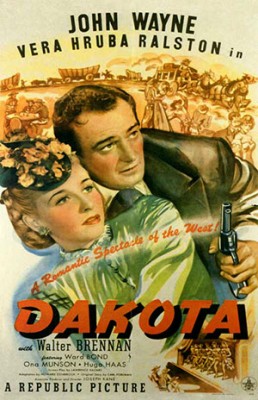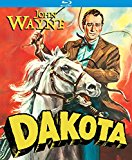| Reviews & Columns |
|
Reviews DVD TV on DVD Blu-ray 4K UHD International DVDs In Theaters Reviews by Studio Video Games Features Collector Series DVDs Easter Egg Database Interviews DVD Talk Radio Feature Articles Columns Anime Talk DVD Savant Horror DVDs The M.O.D. Squad Art House HD Talk Silent DVD
|
DVD Talk Forum |
|
|
| Resources |
|
DVD Price Search Customer Service #'s RCE Info Links |
|
Columns
|
|
|
Dakota
Dakota (1945) falls somewhere in the middle. Like Wayne's other Republics from this period, there's an overemphasis on romance and especially production values: scores of extras, elaborate costumes, a shoehorned musical number or two, all apparently to impress the Big Leagues in Hollywood that Republic, forever straddling between Poverty Row and legitimacy, could make "A" pictures with the best of ‘em. These pictures, and even some of Wayne's outside films earlier in the decade, aimed for colorful, nostalgic depictions of times gone by (the prologue noting that, hey, 1870, the film's setting, was only 70-odd years ago), rather than the kind of breathless Western genre action found in Republic's serials and even some of its singing cowboy films. There's spectacle in every other scene, but audiences would've been happier with Wayne on his horse, six-guns a-blazing. He barely rides in Dakota.
On the other hand, it's also a film that pits Wayne against lots of great heavies, primarily Ward Bond and Mike Mazurki, with Grant Withers in a couple of tense scenes. Walter Brennan plays Wayne's sidekick, and even his co-star, Vera Hruba Ralston (Republic president Herbert J. Yates's mistress), is pretty good here.
Gambler John Devlin (Wayne) secretly marries Sandy (Ralston), the daughter of a Chicago railroad magnate (Hugo Haas). Selling the family's Gainsborough to raise a $20,000 stake, they board a train bound, eventually, for Fargo, in Dakota Territory.
Aware that her father's railroad will soon expand there, she suggests buying up all the marginal wheat farmland there cheap and resell to the railroad at a huge profit. (The movie regards this as ingenious rather than Trump-level unethical.) Unfortunately, another would-be insider trader has already established himself in Fargo, Jim Bender (Ward Bond), influential owner of the local saloon. Aiding Bender are henchman Bigtree Collins (Mike Mazurki) and two lieutenants, Carp (Paul Fix) and Slagin (Grant Withers), the latter stealing the young marrieds' 20-grand, while en route to Fargo aboard Captain Bounce's (Walter Brennan) river boat.
The best thing about Dakota is its cast: Wayne is confident and in his element, even if that element is a little lopsided. Though Bond often played rugged, heavy-drinking and mildly corrupted men of authority, it's unusual to see him playing the lead villain, the "brain heavy" in Western jargon, and he's excellent, projecting real menace, a smiling cobra. Mazurki, fresh from his career-defining role as Moose Malloy in Murder, My Sweet, just starting to earn credited roles after years of bits, is as big and strapping as Wayne, a formidable presence.
Vera Ralston was the dubious star of Yates's vanity showcases for her, yet in Dakota she's almost charming, not glamorous but pretty, and handles her comical scenes with Wayne fairly well. Walter Brennan's character has almost no role in the story yet is given loads of screentime because, well, he's the comedy relief. Many of his scenes have him browbeating his black servant, Nicodemus (Nick Stewart) and aren't funny at all. Though a terrific actor, Brennan was also openly racist and perhaps it was his doing that he addresses Stewart's character not as "Nicodemus," but with the first two syllables altered to something else entirely.
The overemphasis on production is apparent. There are sets and costumed extras galore, with Republic's special effects whizzes Howard and Theodore Lydecker filling in what's left with elaborate if unconvincing miniatures. The occasional silliness of it all is perhaps best exemplified by an off-camera voice signaling the climax: "The wheat fields are burning and the whole country is ablaze!"
Video & Audio
Possibly due to overprinting Dakota has always been one of the worst-looking bigger Wayne movies from Republic. Earlier VHS and DVD versions were pretty awful: dark, damaged, and dupey. Kino's "newly mastered in HD" release is a big improvement, but it's still not up to the shockingly pristine level of even some very minor Republic titles now out on Blu. Dakota is inconsistent; acceptable, barely so, for most of the first-half, and noticeably better later on. The black-and-white, 1.37:1 film has reasonably good DTS-HD Master Audio mono audio, with optional English subtitles, and is region "A" encoded.
Extra Features The one supplement is an audio commentary by Western film historian Toby Roan. His information is good, but there are painfully long stretches where the audio reverts back to the film, especially during the second half, and one becomes very impatient wondering if he'll ever return. Especially given the film's modest running time of 82 minutes, commentaries for movies like this should be packed end to end, with no more than 15- or 20-second gaps.
Parting Thoughts
A mixed bag but a welcome release for John Wayne fans and fair to middling as a Western. Recommended.
Stuart Galbraith IV is the Kyoto-based film historian largely absent from reviewing these days while he restores a 200-year-old Japanese farmhouse.
|
| Popular Reviews |
| Sponsored Links |
|
|
| Sponsored Links |
|
|
| Release List | Reviews | Shop | Newsletter | Forum | DVD Giveaways | Blu-Ray | Advertise |
|
Copyright 2024 DVDTalk.com All Rights Reserved. Legal Info, Privacy Policy, Terms of Use,
Manage Preferences,
Your Privacy Choices | |||||||















